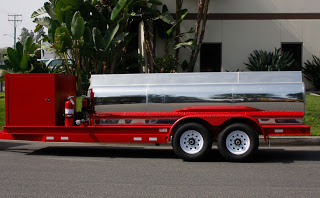Search Posts
Recent Posts
- Customer Spotlight: DeLaurentis International Airport
- HAI Heli Expo Recap 2024
- Environmental Impact: Sustainable Practices in Aviation Fuel Trailer Design
- Case Studies: Successful Applications of Aviation Fuel Trailers in Various Industries
- How Aviation Fuel Trailers Contribute to Efficient Airfield Operations
Categories

Ultimate Guide To Starting A Mobile Gas Fueling Business: Part 1
Friday, February 2, 2018
We are frequently contacted by folks planning on entering the on-site car refueling business.
You may have noticed a few of these operations springing up around the country. The basic premise is to buy a truck or trailer mounted fuel tank system, and travel around the local area filling individual’s gas tanks.
While a few are actually operating, far, far more underestimate the barriers to entry in this market. You cannot simply buy a fuel tank and run around selling gas (or diesel) out of your pickup truck.
In our years of experience building and dealing with these refueling systems, we’ve discovered most of the secrets needed to successfully open your own mobile gas station…
The laws & regulations pertaining to this subject are vast and complex. They are also sometimes contradictory & subject to “interpretation” by a variety of public agencies. From fire departments, to environmental commissions, to planning, to permitting, to the local trade office. Seems like everyone wants a say in how this arena is managed. Having been in the refueler business for over 11 years, We’re still uncovering different interpretations limiting our customers from using mobile fueling systems.
We try to keep up with the federal regulations, but can’t come close to monitoring the thousands of local authorities who wish to have a say in the matter. Clearly stated on our quotes, sales orders, etc is a strong disclaimer that the end user is responsible for compliance with the myriad of rules covering mobile fueling operations & fuel transport.
A quick & basic rundown of what is typically needed to operate as a mobile fuel seller:
Fuel trailer or truck. Must be DOT legal for the type of fuel transported. For diesel, a “non-code” tank if fine. For gas, either a DOT406 or a UN31 rated tank is needed. There is an exception for a very limited number of small (under 119 gallons) tanks that come with a specific DOT exemption letter for gasoline. These tanks are what we base our TransFueler M-Series around. You still need a haz-mat license, but you do not need a DOT406 certified tank with the M-Series. Simple, right?
“Resale Meter” In order to sell fuel, you must have a special meter to ensure you are actually dispensing the amount of fuel you are charging for. Makes sense, you don’t want someone with an inaccurate meter charging you for fuel not delivered. These meters are fairly costly, and must be tested & sealed by usually a county department of weights & measures. You’ll see their “seal” stickers on your local gas pump. They are also the folks who check the scales at the supermarket making sure your meat & produce is accurately weighed.
Haz-Mat license. Federal law requires the driver to have a valid haz-mat endorsement on their drivers license when carrying in excess of 145 gallons. This is a still fairly unknown rule, but as these systems become more popular, expect this to be more widely noticed and enforced.
Those are the basics.
Next time: We discuss the question of fuel truck, versus fuel trailer.
